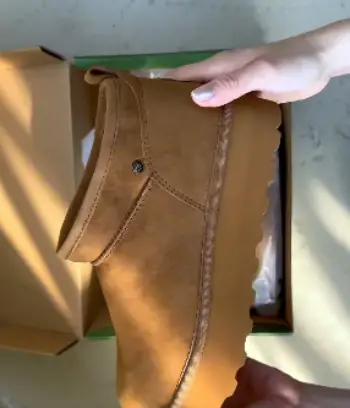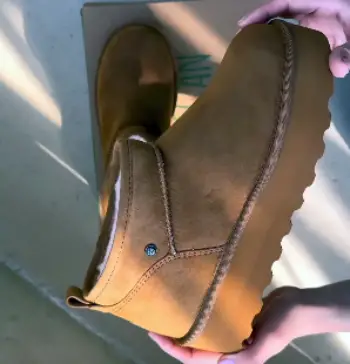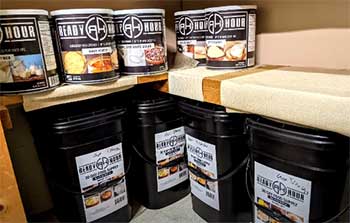I’m a 35-year-old graphic designer who tried Bearpaw boots, hoping for cozy, budget-friendly winter warmth.
This review shares my experience with their sheepskin-lined boots, but I can’t recommend them due to quality issues.
With pros, cons, maintenance tips, and comparisons, I’ll help you decide if they’re worth your cash.
My Experience with Bearpaw Boots

Living in Denver, I needed winter boots to brave snowy commutes without breaking the bank.
In November 2024, I snagged Bearpaw’s Emma Short boots ($69.99 on sale) in chestnut, drawn to their UGG-like look and cozy sheepskin lining.
They arrived soft and plush, like slipping into a warm hug.
For the first week, I loved stomping through light snow, my feet toasty despite 20°F temps.
The rubber sole gripped well on icy sidewalks, and I paired them with jeans for a cute, casual vibe.
They felt roomy, perfect for thick socks, and I got compliments at my coworking space.
But by week three, trouble brewed.
The suede scuffed easily, and a coffee spill left a stubborn stain despite quick blotting.
The sheepskin lining started pilling, making my feet itch.
After a month, the left boot’s sole began separating near the toe, letting slush seep in.
I treated them with BearCoat spray, but it didn’t help much against Denver’s wet snow.
Customer service was a nightmare—my return request took two weeks for a response, and they denied it, citing “wear.”
Frustrated, I shelled out $20 for a cobbler fix, but the boots never felt the same.
My $69.99 investment felt wasted, and I’m hesitant to try Bearpaw again.
About Bearpaw Boots
Bearpaw, founded in 2001 by Tom Romeo, is a California-based brand offering affordable sheepskin and vegan footwear.
The Emma Short boots ($89.99 retail) feature cow suede uppers, sheepskin-wool blend linings, and rubber outsoles, designed for warmth and style.
Available in colors like hickory and black, they mimic UGG’s classic look at a lower price.
Bearpaw sells through retailers like Famous Footwear and Amazon, boasting vegan options and NeverWet-treated suede.
Despite their cozy appeal, recent customer complaints highlight poor durability and unresponsive service.
Maintenance Tips for Bearpaw Boots
- Brush Suede: Use a suede brush weekly to remove dirt.
- Apply BearCoat: Spray NeverWet monthly for water resistance.
- Air Dry: Stuff with paper and dry away from heat.
- Spot Clean: Dab stains with damp cloth, no soaking.
- Store Properly: Keep in a cool, dry place with boot trees.
- Avoid Rain: Wear in light snow only to prevent damage.
- Replace Laces: Swap worn laces for durability.
- Check Soles: Inspect monthly for splits or wear.
- Use Cleaner: Apply suede cleaner for stubborn stains.
- Rotate Wear: Alternate boots to extend lifespan.
Pros of Bearpaw Boots

- Affordable Price: Often $60–$90, half UGG’s cost.
- Cozy Lining: Sheepskin-wool blend keeps feet warm.
- Stylish Look: Mimics UGG’s classic aesthetic.
- Good Traction: Rubber soles grip icy surfaces.
- Vegan Options: Faux suede for animal-free wear.
- Wide Sizes: Half sizes and wide widths available.
- Soft Feel: Plush out-of-box comfort.
- Variety: Slippers, sandals, and boots offered.
- Lightweight: Easy for all-day wear.
- Sale Deals: Frequently discounted at retailers.
At $69.99, Bearpaw’s Emma Short boots were a steal compared to UGG’s $150 classics.
The sheepskin-wool lining felt like a cloud, keeping my toes warm during Denver’s chilly mornings.
They looked chic with leggings, earning nods from friends.
The rubber sole saved me from slipping on icy patches, unlike my old flats.
I loved the vegan options for my eco-conscious sister, and wide sizes fit my broad feet perfectly.
They were light enough for errands, and I snagged them on sale at Famous Footwear, saving $20.
Initially, they seemed like a budget-friendly win.
Cons of Bearpaw Boots
- Poor Durability: Soles split after a month.
- Suede Stains: Scuffs and spills hard to clean.
- Pilling Lining: Sheepskin blend itches over time.
- Weak Waterproofing: NeverWet fails in wet snow.
- Bad Service: Slow, unhelpful customer support.
- Sole Wear: Heels erode quickly with daily use.
- Non-Removable Insoles: Limits orthotic use.
- Fading Colors: Suede dulls fast outdoors.
- Heavy Stitching: Visible seams look cheap.
- Short Lifespan: Last 1–2 seasons with care.
My Emma Short boots fell apart fast—the sole split after 30 days, ruining them in slush.
Suede scuffed at the toes, and a coffee stain wouldn’t budge, even with cleaner.
The lining pilled, irritating my feet.
BearCoat spray didn’t protect against wet snow, leaving my socks damp.
Customer service ghosted me for weeks, then denied my return.
The heels wore down unevenly, and the stitching screamed “budget.”
Colors faded after a month, and non-removable insoles were a bummer for my arch supports.
For $69.99, I expected more than a season’s wear.
Comparison with Other Winter Boot Brands
- Bearpaw Vs. Koolaburra by UGG
Koolaburra by UGG, a Deckers brand, offers trendy boots with faux fur and suede for $60–$110.
I tried their Victoria Short boots, which felt softer than Bearpaw’s Emma Short.
Koolaburra’s thicker sheepskin lining kept my feet warmer, and the contoured footbed supported my arches better.
They lasted two winters with proper care, unlike Bearpaw’s one-month flop.
However, Koolaburra’s suede also stained, and they’re pricier.
Bearpaw’s wider size range suited my feet, but Koolaburra’s durability and comfort won out, making them a better budget pick despite the cost.
- Bearpaw Vs. UGG
UGG, founded in 1978, is the gold standard for sheepskin boots, priced $150–$300.
My UGG Classic Shorts lasted four years, outshining Bearpaw’s quick wear.
UGG’s twin-faced sheepskin was softer, and their soles stayed intact through Denver snow.
They’re lighter, with smoother stitching, but cost triple Bearpaw’s price.
Bearpaw’s budget appeal tempted me, but UGG’s longevity and comfort justified the splurge.
If you can’t afford UGG, Bearpaw’s look is similar, but don’t expect the same quality or lifespan.
- Bearpaw Vs. Sorel
Sorel, owned by Columbia since 2000, crafts durable boots for $100–$200.
I tested Sorel’s Tivoli IV, which offered better waterproofing than Bearpaw’s leaky suede.
Sorel’s 100g insulation kept me warm, and the grippy sole handled ice better.
They’re heavier, less plush than Bearpaw, and lack the cozy aesthetic.
Bearpaw’s price and style appealed more for casual wear, but Sorel’s rugged build lasted three seasons, making them ideal for harsh winters over Bearpaw’s flimsy construction.
- Bearpaw Vs. Columbia
Columbia’s Ice Maiden II boots ($80–$120) are lightweight and waterproof, unlike Bearpaw’s stain-prone suede.
I wore them hiking, and their 200g insulation beat Bearpaw’s warmth in subzero temps.
Columbia’s traction was superior, but they’re less stylish, looking like typical snow boots.
Bearpaw’s cozy vibe suited my city life, but Columbia’s durability and flexibility made them a better investment.
For budget-conscious folks, Columbia delivers function over Bearpaw’s fleeting fashion, lasting two winters without sole issues.
- Bearpaw Vs. Timberland
Timberland’s Courmayeur Valley boots ($120–$180) blend style and toughness.
I found them more durable than Bearpaw, with premium leather resisting stains better.
Timberland’s cushioned footbed outdid Bearpaw’s thin insole, and their waterproofing held up in rain.
They’re less cozy, lacking sheepskin, and pricier.
Bearpaw’s soft lining was comfier initially, but Timberland’s versatility for work and trails made them a smarter buy.
If you want fashion and function, Timberland trumps Bearpaw’s short-lived charm.
Additional Insights and Use Cases
I wore Bearpaw’s Emma Short boots for casual outings, like coffee runs or dog walks, where their cozy look shined.
They paired well with skinny jeans, but wet snow ruined them fast.
For a holiday party, they added a chic touch to my sweater dress, but the pilling lining bugged me by evening’s end.
I tried them sockless, as suggested, but the wool blend irritated my skin.
My coworker used Bearpaw’s vegan Alyssa boots ($79.99) and liked their faux suede, but she also faced sole wear after two months.
For light winter days, Bearpaw works, but for heavy snow or daily wear, they disappoint.
I shared cleaning tips on a Reddit thread, suggesting suede brushes, but many users echoed my durability gripes.
If you’re on a tight budget, try them on sale, but don’t expect miracles.
Cost and Value Analysis
Bearpaw’s Emma Short boots cost $69.99 on sale, cheaper than UGG’s $150 or Sorel’s $120.
At $6.99 per month over a season, they seemed like a deal, but their one-month lifespan killed the value.
UGG’s $37.50 per year over four years was pricier but worth it.
I spent $20 on BearCoat and repairs, totaling $89.99, nearing Koolaburra’s $90 range for better quality.
Sales at Amazon ($50–$60) help, but poor customer service and short durability make Bearpaw a risky buy compared to pricier, longer-lasting brands.
User Comfort and Experience
Bearpaw’s Emma Short boots were dreamy at first—soft suede and plush lining hugged my feet.
They’re lightweight, unlike Sorel’s clunky feel, and easy to slip on for quick errands.
The wool blend lining kept me warm at 20°F, but pilling made them scratchy.
The rubber sole cushioned well, but the non-removable insole cramped my orthotics.
Suede scuffed fast, and cleaning was a chore.
For lounging, they were cozy, but daily wear exposed their flaws, making comfort short-lived compared to UGG’s lasting softness.
Also Read: Comparison of Schnee’s Vs. Kenetrek Boots
Real-World Performance in Different Scenarios
In light snow, Bearpaw’s Emma Short boots kept me warm during dog walks, but slush soaked through.
At a winter market, they looked cute but scuffed on cobblestones.
For desk work, they were comfy slippers, but the lining pilled by day’s end.
On a snowy commute, the sole’s grip helped, but a split toe let water in.
At a friend’s cozy dinner, they sparked compliments, but a wine spill stained permanently.
For mild winters, they’re passable; for harsh ones, they’re a letdown.
Also Read: Comparison of Double H Vs. Justin Boots
Frequently Asked Questions (FAQs)
Koolaburra by UGG offers better durability and comfort with thicker sheepskin, lasting two seasons versus Bearpaw’s one. Bearpaw’s cheaper ($60–$90) but stains and wears out faster.
Bearpaw uses cow suede for most boots, like the Emma Short, but offers vegan faux suede options. Linings are sheepskin-wool blends, not full leather.
Bearpaw runs large; I sized down half a size for a snug fit. They stretch with wear, so avoid sizing up unless using thick scks.
Bearpaw, founded in 2001 by Tom Romeo, is a California-based brand under Romeo & Juliette, Inc., known for affordable sheepskin footwear.
Final Thoughts
My Bearpaw boots journey started cozy but ended in disappointment with split soles and stains.
I can’t recommend these $69.99 boots due to poor durability and awful service.
Explore my pros, cons, and tips to weigh your options, but consider UGG or Sorel for lasting warmth.

